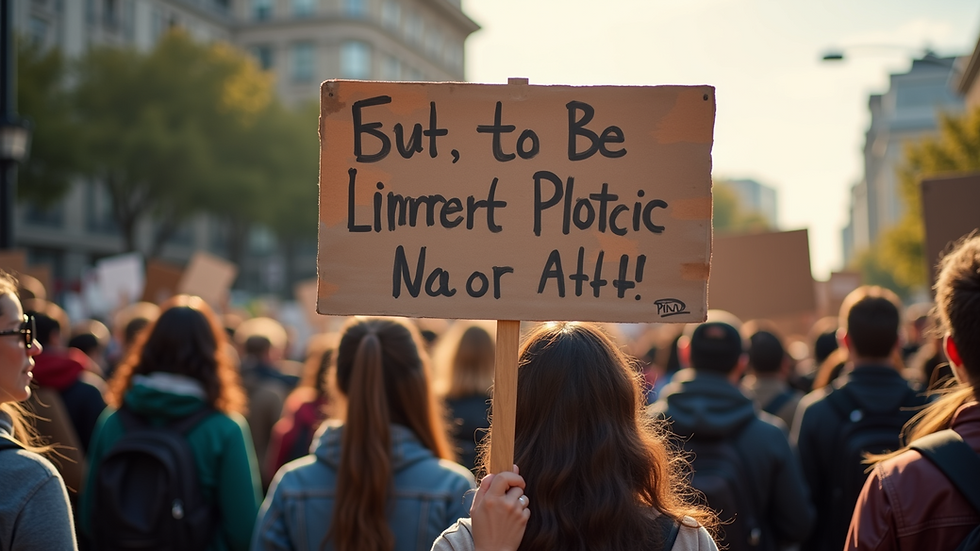Consequences of Labeling Antifa a Major Terrorist Group and Impact on Future Investigations
- jgcarl
- Sep 18, 2025
- 3 min read
The debate over whether Antifa should be classified as a major terrorist group has ignited passionate discussions across the political landscape. This designation could have far-reaching effects on the group, law enforcement, and the way future investigations are conducted. In this post, we will analyze the potential consequences of labeling Antifa, explore its historical context, and discuss the implications for ongoing and future investigations.
Understanding Antifa's Activities
Antifa, short for "anti-fascist," is a decentralized movement opposing far-right ideologies. Many members advocate for social justice and equality, but the group has also been linked to violent protests and clashes. For instance, during the unrest following George Floyd's death in 2020, Antifa members were involved in numerous confrontational incidents, such as the clashes in Portland, where property damage reached into the millions of dollars.
Labeling Antifa a "major terrorist group" suggests a high level of organization and intent, which could prompt law enforcement to increase scrutiny. This focus might shift law enforcement efforts from responding to individual acts of violence to investigating the group's overall structure, funding sources, and interconnections with other organizations.
Legal Implications of the Terrorist Label
Labeling Antifa as a terrorist organization would expand the powers of law enforcement under laws like the USA PATRIOT Act. Such a designation could allow authorities to employ advanced surveillance techniques and intelligence-gathering methods generally used in international terrorism cases.
This change raises critical questions about civil liberties. Critics argue that the designation could criminalize valid dissent and suppress peaceful protests. For example, following 9/11, the U.S. saw significant increases in surveillance and detention practices justified by national security, leading to widespread concerns about the violation of civil rights. However, supporters claim that a formal designation is necessary to combat the violence associated with some Antifa-led protests, which can result in injuries and property damage.
Historical Context of Investigations
Investigations into Antifa have often been inconsistent due to its decentralized nature. Unlike structured organizations, Antifa operates without a clear hierarchy, making it difficult for law enforcement to pinpoint influential leaders or financial backers. This lack of organization has allowed Antifa to evade accountability for violent actions, with many of its protests yielding minimal legal consequences for participants.
If Antifa is declared a terrorist group, prior investigations may receive renewed attention. Law enforcement might revisit cases involving Antifa members to uncover new evidence, potentially leading to reopened cases. For instance, in 2017, the violence at the Unite the Right rally in Charlottesville could see a reevaluation under this new framework, as investigators may look for links between Antifa members and the events that occurred.
Impact on Future Investigations
The repercussions of labeling Antifa as a major terrorist group could significantly impact future investigations. Law enforcement agencies might allocate more resources and personnel to monitor Antifa's activities and affiliations. This more thorough approach could lead to a better understanding of its operations.
Additionally, collaboration among federal, state, and local enforcement agencies could strengthen. Sharing intelligence and resources could result in a unified approach to deal with the perceived threat from Antifa. For example, Task Forces that have been created to address mixed protests may be used to heighten national security and monitor planned demonstrations, thereby increasing the effectiveness of preventative measures.
Public Perception and Political Ramifications
The political implications of labeling Antifa a terrorist group are substantial. For conservatives, this classification could rally support for stricter policies against perceived leftist extremism. A 2021 poll showed that 55% of voters were concerned about Antifa's actions, indicating that there is significant public support for a tougher stance against the group.
Conversely, this label could also lead to political backlash. Critics may perceive the designation as an attempt to silence dissent and stifle voices advocating for social change. This reaction could exacerbate political division, leading to heightened tensions among different factions in society.
Ongoing Discussion of Safety and Rights
The impacts of labeling Antifa as a major terrorist group are layered and multifaceted. The potential legal ramifications, implications for future investigations, and shifts in public perception could reshape how dissent is expressed in America. While some might see this as a necessary move to combat extremism, it is vital to weigh the consequences for civil liberties and public discourse.
As discussions continue, it remains crucial to balance public safety with the right of individuals to express their beliefs. The future of Antifa, alongside how its activities are addressed, will certainly be influenced by the ongoing conversation surrounding this complex issue.





Comments